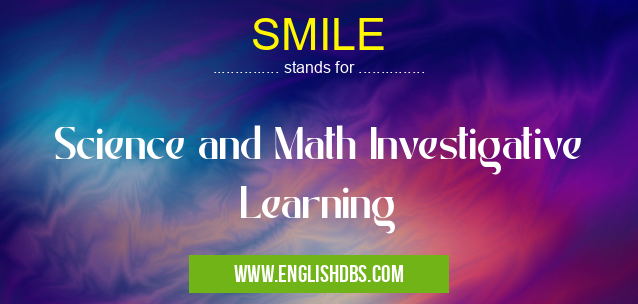What does SMILE mean in ACADEMIC & SCIENCE
SMILE (Science and Math Investigative Learning Environment) is an educational approach that emphasizes hands-on, inquiry-based learning in science and mathematics. It is designed to foster student engagement, curiosity, and problem-solving skills.

SMILE meaning in Academic & Science in Academic & Science
SMILE mostly used in an acronym Academic & Science in Category Academic & Science that means Science and Math Investigative Learning
Shorthand: SMILE,
Full Form: Science and Math Investigative Learning
For more information of "Science and Math Investigative Learning", see the section below.
What does SMILE Stand for?
Science and Math Investigative Learning Environment
Key Features of SMILE
SMILE classrooms are characterized by:
- Hands-on activities: Students actively engage with materials and conduct experiments to explore scientific and mathematical concepts.
- Inquiry-based learning: Students are encouraged to ask questions, formulate hypotheses, and design investigations to test their ideas.
- Problem-solving: Students work collaboratively to solve real-world problems that integrate science and mathematics.
Benefits of SMILE
SMILE has been shown to improve student outcomes, including:
- Increased academic achievement: Students who participate in SMILE programs demonstrate higher levels of scientific and mathematical knowledge and skills.
- Enhanced critical thinking: SMILE fosters students' ability to analyze information, draw conclusions, and make logical connections.
- Improved problem-solving: Students learn to apply scientific and mathematical principles to solve complex problems.
Essential Questions and Answers on Science and Math Investigative Learning in "SCIENCE»SCIENCE"
What is SMILE (Science and Math Investigative Learning)?
SMILE is an educational approach that emphasizes hands-on, inquiry-based learning in science and mathematics. It encourages students to engage in active exploration, problem-solving, and critical thinking to develop a deep understanding of STEM concepts.
How does SMILE differ from traditional science and math instruction?
SMILE prioritizes student engagement and discovery. Students work in collaborative groups, conduct experiments, analyze data, and communicate their findings. In traditional instruction, the focus is often on passive learning, with students receiving information through lectures and textbooks.
What are the benefits of SMILE for students?
SMILE fosters scientific and mathematical literacy, critical thinking, problem-solving abilities, and communication skills. It also promotes teamwork, creativity, and curiosity. By engaging students in hands-on activities, SMILE makes STEM subjects more accessible and engaging.
How can I incorporate SMILE into my classroom?
To incorporate SMILE, provide students with opportunities for hands-on investigations, problem-solving, and group discussions. Encourage them to ask questions, make predictions, and test their hypotheses. Use real-world examples to connect science and math to everyday life.
Is SMILE effective in improving student outcomes?
Research has shown that SMILE can significantly improve student achievement in science and mathematics. Students who engage in SMILE activities demonstrate higher levels of understanding, critical thinking, and problem-solving skills compared to those using traditional methods.
Final Words: SMILE is an effective educational approach that provides students with a deep understanding of science and mathematics. By engaging them in hands-on activities, inquiry-based learning, and problem-solving, SMILE prepares students for success in STEM fields and beyond.
SMILE also stands for: |
|
| All stands for SMILE |
